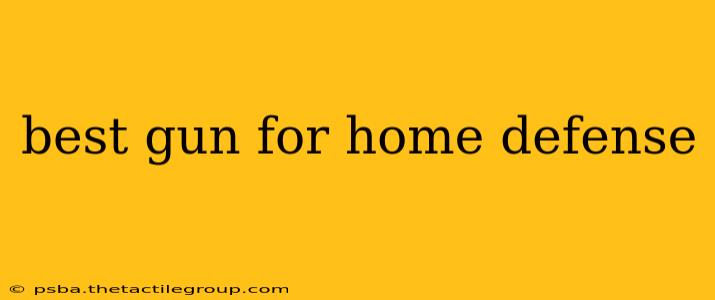Choosing the right firearm for home defense is a deeply personal and crucial decision. There's no single "best" gun, as the ideal choice depends heavily on individual factors like experience level, physical capabilities, and living environment. This guide will explore key considerations to help you make an informed decision, focusing on safety, effectiveness, and responsible gun ownership. Remember, this information is for educational purposes only and should not be considered legal advice. Always consult with local law enforcement and a qualified firearms instructor before purchasing any firearm.
Key Factors to Consider
Before diving into specific firearm types, let's examine the critical elements influencing your choice:
1. Experience Level:
-
Beginner: If you're new to firearms, a simpler, less powerful option is recommended. A .22 LR revolver or a pump-action shotgun with less recoil could be a good starting point. Focus on proper training and safe handling before considering more complex weapons.
-
Experienced Shooter: Experienced shooters may be comfortable with higher-caliber handguns or semi-automatic rifles. However, even experienced users should prioritize manageable recoil and reliable operation in a high-stress situation.
2. Physical Capabilities:
-
Recoil Management: Recoil is the backward force a firearm exerts when fired. Individuals with limited upper body strength or those with physical limitations should prioritize firearms with lower recoil. Smaller calibers and heavier firearms generally have less felt recoil.
-
Size and Weight: Consider the size and weight of the firearm. Can you easily manipulate it, including racking the slide (for semi-automatics) or manipulating the action (for shotguns), under stress? A firearm that's too heavy or bulky may be cumbersome and less effective.
3. Living Environment:
-
Home Size and Layout: Consider the layout of your home. A long gun (shotgun or rifle) might be more effective in a larger space, but a handgun might be more suitable for close-quarters defense within a small apartment.
-
Noise Considerations: The sound of a gunshot can be significant. While not a primary concern for self-defense, consider the potential impact on neighbors, especially in densely populated areas.
Common Home Defense Firearms:
1. Shotguns:
Shotguns, particularly pump-action or semi-automatic models, are popular choices. Their relatively large spread pattern is effective at close range, and the stopping power is significant. However, they can be cumbersome and require more training to use effectively.
2. Handguns:
Handguns offer portability and ease of concealment. Common calibers for home defense include 9mm, .40 S&W, and .45 ACP. Choosing a handgun requires careful consideration of ergonomics, recoil, and reliability.
3. Rifles:
Carbines (short-barreled rifles) offer a balance of maneuverability and stopping power. However, their use in close-quarters spaces requires careful consideration and training.
Choosing the Right Caliber:
The caliber (size of the bullet) is another crucial factor. Larger calibers generally offer greater stopping power, but they also produce more recoil and may be less controllable. Smaller calibers are easier to handle and have less recoil but may require more accurate shot placement. The most common calibers for home defense are 9mm, .40 S&W, .45 ACP (handguns), and 12-gauge (shotguns).
Beyond the Firearm:
The firearm itself is only one part of the equation. Equally important are:
-
Training: Professional firearms training is essential for safe and effective use. Learn proper handling, aiming, and shooting techniques. Consider practicing with your chosen firearm under simulated stress conditions.
-
Ammunition: Choose high-quality ammunition appropriate for your firearm and practice with the same ammunition you intend to use for self-defense.
-
Storage: Store your firearm securely and out of reach of children and unauthorized individuals.
Conclusion:
Selecting the best home defense firearm requires careful consideration of personal factors, training, and responsible gun ownership. There's no universal answer. Prioritize safety, practice regularly, and make an informed decision based on your individual needs and circumstances. Consult with qualified professionals for personalized guidance. Remember, responsible gun ownership is paramount.

